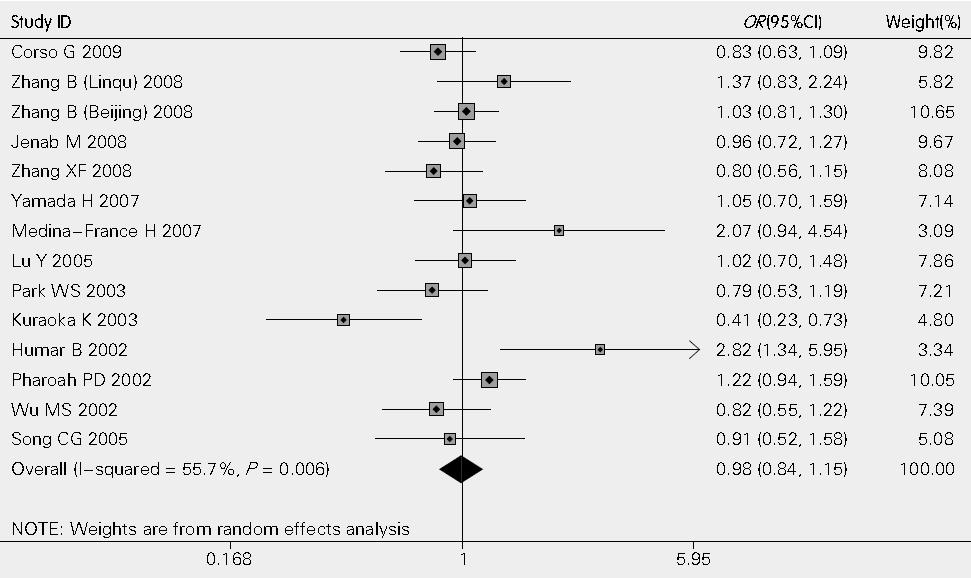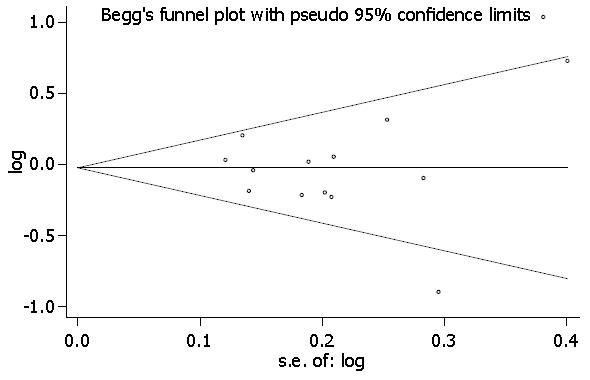修回日期: 2010-03-10
接受日期: 2010-03-15
在线出版日期: 2010-04-28
目的: 探讨CDH1 C-160A基因多态性与胃癌易感性的关系.
方法: 检索中国生物医学文献数据库、万方数据库、中国期刊网和PubMed, 获取CDH1 C-160A基因多态性与胃癌易感性的病例-对照研究. 以胃癌组与对照组人群基因型分布的OR值为效应指标, 采用固定或随机效应模型进行合并分析, 并进行偏倚评估. 应用STATA 10.0软件进行统计学处理.
结果: 共纳入文献13篇, 研究14项, 累计胃癌病例3 144例, 对照4 221例. 与野生基因型CC相比, (CA+AA)合并的OR值(95%CI)为0.98(0.84-1.15). 按人群进行分层分析, 亚洲人群OR值为0.92(0.81-1.04), 高加索人群OR值为1.21(0.88-1.67).
结论: CDH1 C-160A基因多态性与胃癌易感性无关.
引文著录: 曹伟军, 张振玉, 岳巧艳. CDH1 C-160A基因多态性与胃癌易感性的Meta分析. 世界华人消化杂志 2010; 18(12): 1270-1274
Revised: March 10, 2010
Accepted: March 15, 2010
Published online: April 28, 2010
AIM: To investigate the relationship between E-cadherin (CDH1) gene C-160A promoter polymorphism and genetic susceptibility to gastric cancer.
METHODS: Chinese biomedicine disc (CBM), Wanfang database, China National Knowledge Infrastructure (CNKI) and PubMed were searched for published case-control studies investigating the association between CDH1 C-160A promoter polymorphism and susceptibility to gastric cancer. The odds ratio was calculated to evaluate the genotypes of gastric cancer patients and control subjects. Fixed or random effect models were selected for pooled odds ratio calculation. Publication bias was assessed. All statistical analyses were conducted with Stata 10.0 software.
RESULTS: A total of 14 case-control studies involving 3 144 gastric cancer patients and 4 221 controls were analyzed in the study. Compared with the wild-type genotype (homozygote CC), the pooled odds ratio [and 95% confidence interval (CI)] for CA and AA genotypes was 0.98 (0.84-1.15). In the population subgroup analysis, the odds ratios for Asian and Caucasian populations were 0.92 (0.81-1.04) and 1.21 (0.88-1.67), respectively.
CONCLUSION: CDH1 C-160A promoter polymorphism is not associated with genetic susceptibility to gastric cancer.
- Citation: Cao WJ, Zhang ZY, Yue QY. CDH1 C-160A promoter polymorphism and genetic susceptibility to gastric cancer: a meta-analysis. Shijie Huaren Xiaohua Zazhi 2010; 18(12): 1270-1274
- URL: https://www.wjgnet.com/1009-3079/full/v18/i12/1270.htm
- DOI: https://dx.doi.org/10.11569/wcjd.v18.i12.1270
胃癌是常见的恶性肿瘤, 多种环境因素, 如幽门螺杆菌(H. pylori)感染, 高盐饮食, 维生素C摄入不足, 吸烟等被认为与胃癌的发生密切相关[1-3]. 近年来, 基因遗传易感性在胃癌的发生发展过程中的作用逐渐受到关注[4,5]. 上皮钙黏蛋白(E-cadherin)的编码基因CDH1是一种肿瘤抑制基因和肿瘤转移抑制基因, 与多种上皮来源的恶性肿瘤的发生、发展、侵袭转移密切相关[6]. 有研究表明, CDH1启动子上游第160位核苷酸存在C→A单核苷酸多态性(single nucleotide polymorphism, SNP), 该SNP可改变基因转录活性[7], 从而可能改变上皮性肿瘤发病风险和侵袭转移能力. CDH1 C-160A基因多态性与胃癌发病风险的研究较多, 但结果不一致. 本文对相关的病例对照研究进行Meta分析, 定量评价CDH1 C-160A基因多态与胃癌发病风险的相关性.
在中国生物医学文献数据库(CBM)、万方数据库、中国期刊网(CNKI)中检索中文文献, 检索词为胃癌, 胃肿瘤, CDH1, E-cadherin, E-钙黏蛋白, 基因多态. 在PubMed数据库中检索英文文献, 检索词为gastric cancer, stomach cancer, stomach neoplasms, CDH1, E-cadherin, polymorphism, 并辅以文献追溯法查找相关文献.
1.2.1 文献纳入标准: (1)2010-01-01以前公开发表的关于CDH1 C-160A基因多态性与胃癌易感性关系的独立的病例对照研究; (2)文中报告数据完整, 能直接或间接提供统计指标OR及95%CI.
1.2.2 文献排除标准: (1)报告数据不完整, 无法提取相关数据; (2)重复发表的文献.
1.2.3 数据提取: 对于纳入的文章, 我们均按照作者、发表年份、试验人群的来源、对照人群的来源, 以及肿瘤组和对照组各基因型携带者的数量进行整理.
统计学处理 通过计算Q检验统计量进行异质性检验, 若P>0.10, 认为各合并的数据无显著的异质性, 采用固定效应模型, 否则采用随机效应模型进行分析. 计算各研究及合并数据的OR值及其95%CI, 绘制森林图, 展示各研究结果及其特征. 以各研究OR自然对数值的标准误为横坐标, OR值的自然对数为纵坐标, 绘制漏斗图(Begg's funnel plot)描述发表偏倚, STATA 10.0软件的线性回归模型(Egger法)检验漏斗图的对称性, 评估发表偏倚.
符合标准的文献共13篇[8-20], 除1篇为中文文献[13]外, 另12篇均为英文文献, 其中研究中国人群的文献5篇[8,13,14,17,19]. Zhang等[19]的文献报道了对两个不同人群的研究结果, 因此共有14项研究被纳入到Meta分析. 累计胃癌病例3 144例, 对照4 221例(表1).
| 作者 | 年份 | 人群 | 对照来源 | 肿瘤组 | 对照组 | ||||
| CC | CA | AA | CC | CA | AA | ||||
| Wu等[8] | 2002 | 亚洲 | 医院a | 95 | 102 | 4 | 83 | 94 | 19 |
| Pharoah等[9] | 2002 | 高加索 | 医院 | 181 | 214 | 38 | 218 | 210 | 38 |
| Humar等[10] | 2002 | 高加索 | 医院 | 17 | 26 | 10 | 40 | 27 | 3 |
| Kuraoka等[11] | 2003 | 亚洲 | 医院 | 61 | 34 | 11 | 32 | 52 | 6 |
| Park等[12] | 2003 | 亚洲 | 医院 | 186 | 92 | 14 | 85 | 55 | 6 |
| Song等[13] | 2005 | 亚洲 | 医院 | 58 | 38 | 6 | 55 | 41 | 5 |
| Lu等[14] | 2005 | 亚洲 | 人群b | 119 | 75 | 12 | 152 | 91 | 18 |
| Medina-Franco等[15] | 2007 | 高加索 | 医院 | 15 | 16 | 8 | 44 | 30 | 4 |
| Yamada等[16] | 2007 | 亚洲 | 医院 | 93 | 51 | 4 | 187 | 93 | 12 |
| Zhang等[17] | 2008 | 亚洲 | 医院 | 170 | 62 | 7 | 228 | 96 | 19 |
| Jenab等[18] | 2008 | 高加索 | 人群 | 119 | 101 | 25 | 451 | 408 | 90 |
| Zhang等[19](Beijing) | 2008 | 亚洲 | 医院 | 365 | 173 | 34 | 403 | 194 | 28 |
| Zhang等[19](Linqu) | 2008 | 亚洲 | 医院 | 53 | 38 | 5 | 123 | 65 | 8 |
| Corso等[20] | 2009 | 高加索 | 医院 | 206 | 163 | 43 | 185 | 185 | 38 |
对14项研究进行异质性检验, 各研究之间存在明显的异质性(χ2 = 29.35, P = 0.006), 采用随机效应模型, 结果显示合并OR值为0.98, 95%CI为0.84-1.15(图1). 根据研究人群进行分层分析结果显示, 亚洲人群的9个研究之间无明显异质性(χ2 = 13.08, P = 0.109), 采用固定效应模型, 合并OR值为0.92, 95%CI为0.81-1.04; 高加索人群的5个研究之间存在明显异质性(χ2 = 14.10, P = 0.007), 采用随机效应模型, 合并OR值为1.21, 95%CI为0.88-1.67(表2).
| 人群 | 研究个数 | 分析模型 | OR | 95%CI | P值 | χ2值 |
| 亚洲 | 9 | 固定效应 | 0.92 | 0.81-1.04 | 0.109 | 13.08 |
| 高加索 | 5 | 随机效应 | 1.21 | 0.88-1.67 | 0.007 | 14.10 |
Begg漏斗图显示, 各点分别均匀, 基本对称, 绝大部分点都在95%可信区间内(图2). Egger检验显示, 偏倚系数(Coef.)为0.70, 95%CI: -2.05-3.45, 可信区间包含0, 且P = 0.59>0.05, 故不能认为有显著性发表偏倚.
CDH1基因位于16q22.1, 其产物上皮钙黏蛋白E-cadherin是一种介导细胞间黏附的钙依赖跨膜糖蛋白, 在维持细胞间黏附完整性和细胞极性、参与胞间信号传导、调节组织发生和形态变化等方面发挥着关键作用[6]. E-cadherin功能的缺失是上皮细胞向恶性表型转化的关键步骤.
Li等[21]在体外研究中发现CDH1 C-160A多态性改变了基因的转录活性, 其A等位基因可以使基因的转录活性下降68%. 这可能导致E-cadherin表达水平降低, 从而增加上皮性肿瘤的发病风险. 近期的研究发现, CDH1 C-160A基因多态性是结肠癌和前列腺癌的危险因素[22,23].
我们对14项研究的Meta分析结果显示, 合并OR值为0.98, 95%CI为0.84-1.15, 提示CDH1 C-160A基因多态性与胃癌的易感性无关. 对人群的分层分析显示, 虽均无统计学意义, 但CDH1 C-160A多态性在亚洲人群中有降低胃癌发生的趋势, 在高加索人群中有增加胃癌发生的趋势. 这种现象可能与不同人群之间的遗传背景不同有关. 另外, 胃癌的发生是个多因素、多步骤发展的过程, 可能涉及基因-基因交互作用, 基因-环境交互作用等多种因素的作用, 而这些因素可能会影响CDH1 C-160A基因多态性与胃癌的发病风险.
我们对纳入文献进行了H-W遗传平衡检验, 除其中1篇文献[11]外其余研究均符合H-W遗传平衡定律, 而剔除该研究后, 本文结果并无明显的改变. 我们采用Begg漏斗图和Egger检验分别定性和定量地评估了发表偏倚, 提示本文并无显著的发表偏倚, 说明结论较可靠.
本研究也存在一定的局限性: (1)由于收集的资料均为在正式刊物上发表的文献, 因此不能完全排除发表偏倚的影响; (2)对照的来源大部分为医院对照, 可能存在一定的选择性偏倚; (3)由于文献提供的资料有限, 本研究未考虑到基因-基因、基因-环境的交互作用. 因此, CDH1 C-160A基因多态性与胃癌的易感性的研究有必要进一步深入, 为阐明易感基因在胃癌发病中的作用提供依据.
胃癌是人类常见的恶性肿瘤, 其病因及发病机制尚不明确. 环境与饮食习惯、幽门螺杆菌感染等与胃癌密切相关, 基因遗传易感性在胃癌中的作用也引起人们的重视. 寻找与胃癌相关的遗传位点对胃癌的防治有重要意义.
刘云鹏, 教授, 中国医科大学附属第一医院肿瘤内科; 王晓艳, 副教授, 湖南长沙中南大学湘雅三医院消化内科
单核苷酸多态性(SNP)与肿瘤易感性的关系是近年研究的热点. 目前研究较多的, 与胃癌相关的SNP位点主要有: GSTT1 Null, TNF-A G-308A, MTHFR C667T, IL-1B C-511T等.
Pittman等的1项研究纳入了5 679名结肠癌患者, 结果显示CDH1 C-160A显著增加结肠癌的发病风险, 与野生基因型CC相比, (CA+AA)合并的OR值(95%CI)为1.11(1.05-1.17).
本研究选题较有意义, 设计合理, 思路清晰, 数据可靠, 统计分析方法适当, 结果分析较透彻, 对人群胃癌危险度评估和防治提供了有意义的结果.
编辑: 李军亮 电编: 何基才
| 1. | Murakami K, Kodama M, Fujioka T. Latest insights into the effects of Helicobacter pylori infection on gastric carcinogenesis. World J Gastroenterol. 2006;12:2713-2720. [PubMed] [DOI] |
| 2. | Tsugane S. Salt, salted food intake, and risk of gastric cancer: epidemiologic evidence. Cancer Sci. 2005;96:1-6. [PubMed] [DOI] |
| 3. | Kelley JR, Duggan JM. Gastric cancer epidemiology and risk factors. J Clin Epidemiol. 2003;56:1-9. [PubMed] [DOI] |
| 4. | González CA, Sala N, Capellá G. Genetic susceptibility and gastric cancer risk. Int J Cancer. 2002;100:249-260. [PubMed] [DOI] |
| 5. | Roberts-Thomson IC, Butler WJ. Polymorphism and gastric cancer. J Gastroenterol Hepatol. 2005;20:793-794. [PubMed] [DOI] |
| 6. | Van Aken E, De Wever O, Correia da Rocha AS, Mareel M. Defective E-cadherin/catenin complexes in human cancer. Virchows Arch. 2001;439:725-751. [PubMed] [DOI] |
| 7. | Cattaneo F, Venesio T, Molatore S, Russo A, Fiocca R, Frattini M, Scovassi AI, Ottini L, Bertario L, Ranzani GN. Functional analysis and case-control study of -160C/A polymorphism in the E-cadherin gene promoter: association with cancer risk. Anticancer Res. 2006;26:4627-4632. [PubMed] |
| 8. | Wu MS, Huang SP, Chang YT, Lin MT, Shun CT, Chang MC, Wang HP, Chen CJ, Lin JT. Association of the -160 C --> a promoter polymorphism of E-cadherin gene with gastric carcinoma risk. Cancer. 2002;94:1443-1448. [PubMed] [DOI] |
| 9. | Pharoah PD, Oliveira C, Machado JC, Keller G, Vogelsang H, Laux H, Becker KF, Hahn H, Paproski SM, Brown LA. CDH1 c-160a promotor polymorphism is not associated with risk of stomach cancer. Int J Cancer. 2002;101:196-197. [PubMed] [DOI] |
| 10. | Humar B, Graziano F, Cascinu S, Catalano V, Ruzzo AM, Magnani M, Toro T, Burchill T, Futschik ME, Merriman T. Association of CDH1 haplotypes with susceptibility to sporadic diffuse gastric cancer. Oncogene. 2002;21:8192-8195. [PubMed] [DOI] |
| 11. | Kuraoka K, Oue N, Yokozaki H, Kitadai Y, Ito R, Nakayama H, Yasui W. Correlation of a single nucleotide polymorphism in the E-cadherin gene promoter with tumorigenesis and progression of gastric carcinoma in Japan. Int J Oncol. 2003;23:421-427. [PubMed] [DOI] |
| 12. | Park WS, Cho YG, Park JY, Kim CJ, Lee JH, Kim HS, Lee JW, Song YH, Park CH, Park YK. A single nucleotide polymorphism in the E-cadherin gene promoter-160 is not associated with risk of Korean gastric cancer. J Korean Med Sci. 2003;18:501-504. [PubMed] [DOI] |
| 13. | Song CG, Huang CM, Liu X, Lu HS, Zhang XF, Huang W. [Association of -160(C-->A) polymorphism in CDH1 gene with gastric cancer risk in Fujian Chinese population]. Zhonghua Yixue Yichuanxue Zazhi. 2005;22:557-559. [PubMed] |
| 14. | Lu Y, Xu YC, Shen J, Yu RB, Niu JY, Guo JT, Hu X, Shen HB. E-cadherin gene C-160A promoter polymorphism and risk of non-cardia gastric cancer in a Chinese population. World J Gastroenterol. 2005;11:56-60. [PubMed] [DOI] |
| 15. | Medina-Franco H, Ramos-De la Medina A, Vizcaino G, Medina-Franco JL. Single nucleotide polymorphisms in the promoter region of the E-cadherin gene in gastric cancer: case-control study in a young Mexican population. Ann Surg Oncol. 2007;14:2246-2249. [PubMed] [DOI] |
| 16. | Yamada H, Shinmura K, Ikeda S, Tao H, Otani T, Hanaoka T, Tsuneyoshi T, Tsugane S, Sugimura H. Association between CDH1 haplotypes and gastric cancer risk in a Japanese population. Scand J Gastroenterol. 2007;42:1479-1485. [PubMed] [DOI] |
| 17. | Zhang XF, Wang YM, Ge H, Cao YY, Chen ZF, Wen DG, Guo W, Wang N, Li Y, Zhang JH. Association of CDH1 single nucleotide polymorphisms with susceptibility to esophageal squamous cell carcinomas and gastric cardia carcinomas. Dis Esophagus. 2008;21:21-29. [PubMed] |
| 18. | Jenab M, McKay JD, Ferrari P, Biessy C, Laing S, Munar GM, Sala N, Peña S, Crusius JB, Overvad K. CDH1 gene polymorphisms, smoking, Helicobacter pylori infection and the risk of gastric cancer in the European Prospective Investigation into Cancer and Nutrition (EPIC-EURGAST). Eur J Cancer. 2008;44:774-780. [PubMed] [DOI] |
| 19. | Zhang B, Pan K, Liu Z, Zhou J, Gu L, Ji J, Ma J, You WC, Deng D. Genetic polymorphisms of the E-cadherin promoter and risk of sporadic gastric carcinoma in Chinese populations. Cancer Epidemiol Biomarkers Prev. 2008;17:2402-2408. [PubMed] [DOI] |
| 20. | Corso G, Berardi A, Marrelli D, Pedrazzani C, Garosi L, Pinto E, Roviello F. CDH1 C-160A promoter polymorphism and gastric cancer risk. Eur J Cancer Prev. 2009;18:46-49. [PubMed] [DOI] |
| 21. | Li LC, Chui RM, Sasaki M, Nakajima K, Perinchery G, Au HC, Nojima D, Carroll P, Dahiya R. A single nucleotide polymorphism in the E-cadherin gene promoter alters transcriptional activities. Cancer Res. 2000;60:873-876. [PubMed] |
| 22. | Pittman AM, Twiss P, Broderick P, Lubbe S, Chandler I, Penegar S, Houlston RS. The CDH1-160C>A polymorphism is a risk factor for colorectal cancer. Int J Cancer. 2009;125:1622-1625. [PubMed] [DOI] |
| 23. | Qiu LX, Li RT, Zhang JB, Zhong WZ, Bai JL, Liu BR, Zheng MH, Qian XP. The E-cadherin (CDH1)--160 C/A polymorphism and prostate cancer risk: a meta-analysis. Eur J Hum Genet. 2009;17:244-249. [PubMed] [DOI] |










